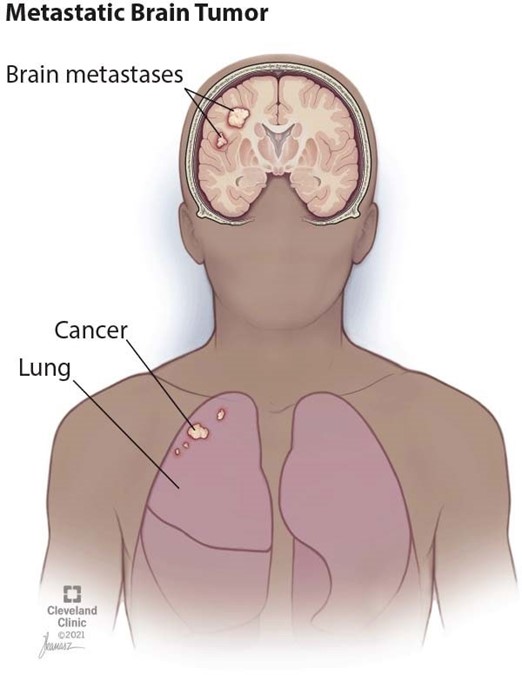What are some of the nursing interventions for the patient with nervous system metastases or primary brain tumor?
Referral to counselor, social worker, home health care, support groups
Presence of family, friends, spiritual advisor, and health care personnel may be supportive
Encourage independence for as long as possible
All of the above
The Correct Answer is D
Choice A: Referral to counselor, social worker, home health care, support groups is correct because it can help the patient cope with the emotional, social, and practical aspects of living with a brain tumor. It can also provide information, resources, and assistance to the patient and their caregivers.
Choice B: Presence of family, friends, spiritual advisor, and health care personnel may be supportive is correct because it can provide comfort, companionship, and guidance to the patient. It can also help the patient express their feelings, needs, and preferences.
Choice C: Encourage independence for as long as possible is correct because it can enhance the patient's self-esteem, dignity, and quality of life. It can also help the patient maintain their physical and mental abilities and prevent complications such as depression, anxiety, or immobility.
Choice D: All of the above are correct because they are part of the holistic nursing care for the patient with nervous system metastases or primary brain tumor. They can address the physical, psychological, social, and spiritual needs of the patient and their family.

Nursing Test Bank
Naxlex Comprehensive Predictor Exams
Related Questions
Correct Answer is C
Explanation
Choice A: Loss of motor neurons in the brain is not a complete definition of ALS, as it does not include the loss of motor neurons in the spinal cord and brainstem.
Choice B: Loss of sensory neurons in the anterior horn of the spinal cord is not a correct definition of ALS, as it involves sensory neurons, not motor neurons.
Choice C: Loss of motor neurons in the anterior horn of the spinal cord and loss of motor nuclei of the lower brainstem is a correct definition of ALS, as it describes the progressive degeneration and death of both upper and lower motor neurons that control voluntary muscle movements²⁴.
Choice D: All of the above is not correct, as only choice C is a correct definition of ALS.
Correct Answer is B
Explanation
Choice A: When patient is fully oriented is incorrect because it is a positive sign of recovery from a concussion. It means that the patient is aware of their person, place, time, and situation. The nurse should monitor the patient's orientation status but does not need to report it to the doctor immediately.
Choice B: Difficulty in awakening, lethargy, dizziness, confusion, irritability, anxiety are correct because they are signs of worsening brain injury or complications from a concussion. They may indicate increased intracranial pressure, bleeding, swelling, or infection in the brain. The nurse should report these symptoms to the doctor immediately and prepare for further diagnostic tests or interventions.
Choice C: When patient is easy to arouse is incorrect because it is also a positive sign of recovery from a concussion. It means that the patient responds quickly and appropriately to verbal or physical stimuli. The nurse should monitor the patient's level of consciousness but does not need to report it to the doctor immediately.
Choice D: All of the above are incorrect because only choice b) requires immediate reporting to the doctor. Choices a) and c) are normal or expected outcomes of a concussion and do not indicate any danger or complication. The nurse should use clinical judgment and follow the guidelines for concussion management and care.
Whether you are a student looking to ace your exams or a practicing nurse seeking to enhance your expertise , our nursing education contents will empower you with the confidence and competence to make a difference in the lives of patients and become a respected leader in the healthcare field.
Visit Naxlex, invest in your future and unlock endless possibilities with our unparalleled nursing education contents today
Report Wrong Answer on the Current Question
Do you disagree with the answer? If yes, what is your expected answer? Explain.
Kindly be descriptive with the issue you are facing.
